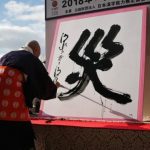WIT Life #331: Kanji of the Year
Written by professional Writer/Interpreter/Translator Stacy Smith (Kumamoto-ken CIR, 2000-03), WIT Life is a periodic series about aspects of Japanese culture such as film, food and language. Stacy starts her day by watching Fujisankei’s newscast in Japanese, and here she shares some interesting tidbits and trends along with her own observations.
As my last post mentioned we are in the midst of the “best of” season, and the latest is the anno uncement of the kanji of the year. The pick for 2018 is 災 (sai, or disaster), as in 自然災害 (shizen saigai or natural disaster) and 災い (wazawai or trouble/misfortune). As Japan is no stranger to natural disasters, this kanji had been chosen once before in 2004. That was the year of the Niigata Chuetsu Earthquake, the deadliest earthquake to strike Japan since 1995’s Great Hanshin earthquake (incidentally, the kanji of the year tradition began that year with the selection of 震 (shin or earthquake)). This year a big earthquake causing landslides hit Hokkaido, heavy rains caused floods and mudflows in Kyushu, and there were also major heat waves and typhoons throughout the country.
uncement of the kanji of the year. The pick for 2018 is 災 (sai, or disaster), as in 自然災害 (shizen saigai or natural disaster) and 災い (wazawai or trouble/misfortune). As Japan is no stranger to natural disasters, this kanji had been chosen once before in 2004. That was the year of the Niigata Chuetsu Earthquake, the deadliest earthquake to strike Japan since 1995’s Great Hanshin earthquake (incidentally, the kanji of the year tradition began that year with the selection of 震 (shin or earthquake)). This year a big earthquake causing landslides hit Hokkaido, heavy rains caused floods and mudflows in Kyushu, and there were also major heat waves and typhoons throughout the country.
But it wasn’t only natural disasters that led to 災. There was also an abundance of man-made disasters such as power harassment in the sports world, Finance Ministry bureaucrats tampering with official documents in a political scandal, and the rigging of entrance exam scores that discriminated against female applicants at medical universities.
In person-on-the-street interviews on this morning’s news, interviewees reacted to the selection of 災. One young woman thought it made sense in light of all the horrible landslides and floods, but an older woman said she found it dark and would have preferred something brighter. Others offered alternatives such as 助 (jo or help, as in 助ける (tasukeru)), to describe the way people came together around the tragedies.
Others were asked for their personal kanji of the year, and a middle-aged man said his would be 忙 (bou or busy, as in 忙しい (isogashii)), but hoped next year he’d be able to pick 楽 (raku or easy/comfortable). A student who had just returned from abroad gave 和 (wa or peace) as her pick, as she had missed 和食 (washoku or Japanese food) while away (unbeknownst to her, 和 was actually the runner-up for this year).
Prominent political figures such as PM Abe and Chief Cabinet Secretary Suga were also asked to weigh in. The former went with 転 (ten or turn/roll, as in 転換点 (tenkanten or turning point)). As the reasons for his choice, he cited the new generation of sports leaders as well as the renewed relationship with Russia. The latter selected 成 (sei or to become, as in 成し遂げる (nashitogeru or to accomplish)), highlighting the fulfillment of this administration’s goal of work style reform.
What would you pick as your kanji of the year? Wishing all readers a wonderful holiday season and a happy, healthy 2019!


Comments are closed.